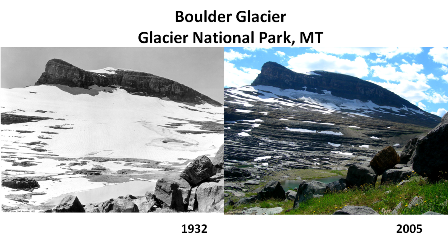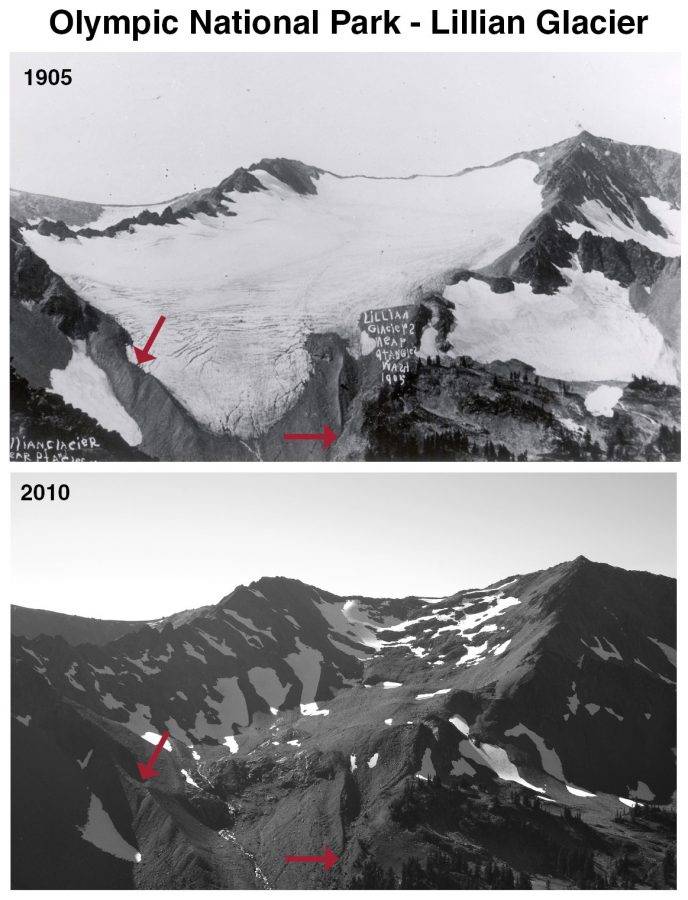Climate Change Deniers – How do they justify themselves?
National Park Service for Educational Use
This photo shows the recession of the Lillian Glacier at Olympic National Park.
Before you start to read this article, think about this: when was the last time you used a car but could have used your bike? The last time you used a computer, did you shut it down or just let it sit there in energy saving mode? Did you turn off your lights this morning? These are little things that are part of why our climate is changing so fast. Many people do not see climate change as the huge problem it actually is and some just don’t care because they feel like it does not affect their generation and that’s all they are concerned with. Data shows that, if we keep living an environmentally unfriendly lifestyle, by 2100 many Americans living on the west coast will lose their homes because the sea level will have risen too high. Although much alarming data is available, there are still people who deny climate change. How do these people justify themselves?
One of the most common arguments used to deny global warming is that it is part of a natural process, that it had happened before, and that climate is changing constantly. It is definitely true that the climate has changed many times and that there were several warm periods, such as the Medieval Warm Period. Indeed, the temperatures during that period were about the same as today, but they rose more slowly back then and afterward the temperatures constantly fell until the early 1900s, when the temperatures suddenly started to rise again. In the last century, the average temperature in Michigan rose about 3°F. That may not seem like a lot to you, but it is actually the fastest temperature change in history. This shows that while climate change can indeed be natural or cyclical, humanity and the rise of industry is accelerating the process.
Another popular objection is to deny that anything is happening at all and that all the evidence is not accurate because a hundred years of record are not enough not make any predictions. Since glaciers have always melted and then grown and we can’t even predict the temperatures of the next week exactly, climate change deniers argue that scientists are unable to predict global warming. Although 100 years may not be a lot, NASA data shows that our 10 warmest years ever recorded have occurred since 1998. Although some glaciers had melted before the start of global warming, it is not in the same dimension, as you can see on the picture. This picture is just one example of many glacial areas today. The Glacier National Park counted 150 glaciers in 1850 and today there are only 25 left that are big enough to count as a glacier.

The phrase “we just can’t stop it” is often extreme popular among climate change deniers. They call it too late and wonder why the US should establish strict climate regulations while China and other countries don’t, mostly because there are often negative economic consequences associated with pro-climate measures. Obviously, without the work of huge industrial countries like China, which is the world’s largest gas emitter, it is considerably harder to slow down global warming. Climate change legislation might harm the economy, but the consequences of keeping going like we presently are could be even worse. Natural disasters could occur more often, which will not only cause damaged factories, atomic plants, and infrastructure, but the rising sea level could force millions of people to migrate. On the positive side, climate regulations could possibly expand our market in new directions. “By the U.S. adopting strict climate regulation, we will invent technologies and make them affordable that other nations will adopt later on. Even if we are not major contributors to the pollution, we can be major contributors to the solution,” says Colin Killmer, a science teacher at Portage Northern.
There is simply too much science behind global warming to deny it. In a report published by the Environmental Protection Agency, 97% of climate scientists worldwide agree that climate change is real, man-made, and affecting communities in every part of the country. Humanity has a history of denying the truth because it is inconvenient, but this might be a luxury we can’t afford for much longer if we do not start to recognize the reality of climate change.




